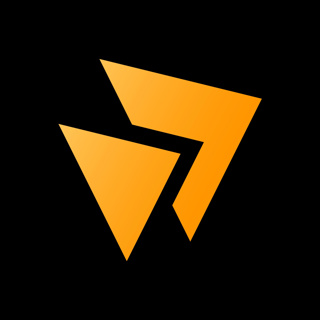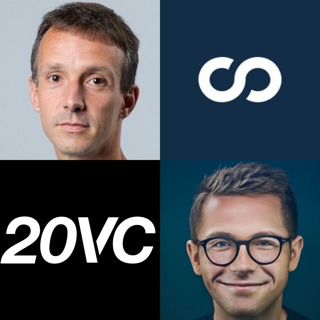
20VC: Why Greed is the #1 Enemy of Venture Returns, Why Not Enough VCs Play to Win and Lessons from Scaling to $100M and 1,200 Employees and Then Cratering with Julio Vasconcellos, Founder @ Atlantico
Julio Vasconcellos is the Founder and Managing Partner @ Atlantico, one of the leading early-stage funds in Latin America. Prior to the world of venture, Julio got his break in the world of startups as Facebook's first country lead for Brazil. Julio then went on to co-found Peixe Urbano, a company he scaled to over 1,200 employees and $100M+ in revenue. Post the sale of Peixe Urbano, Julio became an EiR @ Benchmark Capital where he met Scott Belsky. Scott and Julio went on to co-found Prefer, a Benchmark backed company transforming the future of work. If that was not enough, Julio has a stellar angel track record with prior investments in the likes of Ipsy and Quinto Andar. In Today's Episode with Julio Vasconcellos We Discuss: 1.) Entry into Startups: What are 1-2 of Julio's biggest takeaways from being Facebook's first hire in Brazil? What does Julio know now that he wishes he had known at the start of his career in startups? 2.) Lessons from Scaling Peixe Urbano to $100M in Revenue: How does Julio advise founders on when is the right time to launch a second product or market? How does Julio advise founders on the right balance between growth and unit economics? When times are tougher, should founders cut fast or cut slower? What is irreversible? What are the single biggest and worst things to break in hyper-scaling? 3.) Investing: Why Not Enough Play To Win: What is more important, a great market or a great founder? Why do not enough VCs today play to win? If they do not play to win, what do they play to do? Why is greed the number one enemy of venture returns? What are the single biggest investing lessons Julio has learned from Benchmark Founder, Andy Rachleff? How have they impacted his investing mindset? Why does Julio believe you can have a close relationship with founders as an angel and not a VC? How did Julio's approach to investing change with the transition from angel to VC? Does Julio believe that boards really add any value? If so, how? What is Julio's biggest investing hit? How did it change his approach? What is his biggest miss? How did that impact his mindset? 4.) The Future for LATAM: Is Julio as concerned as I am by the removal of growth stage capital from the LATAM ecosytem? Does this mean a higher mortality rate for LATAM companies? How does Julio advise founders? How did COVID adoption of technology in LATAM fundamentally differ to the US?
23 Syys 202249min
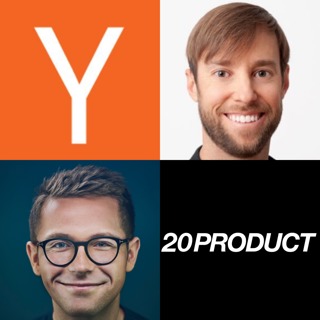
20 Product: The No 1 Metric You Need To Look at When Building Product | Why the Best in Product Have No Domain Experience | Why You Should Not Hire From Incumbents & The Difference Between Good vs Great PMs with David Lieb, Visiting Group Partner @ Y Comb
David Lieb is one of the product OGs of the last decade. As the founder of Bump David pioneered how over 150M users shared data, contacts and more before the company was acquired by Google. At Google, David took this one step further by creating Google Photos, which he has led with immense success for the last 9 years. In the last few weeks, David announced his latest move, to join Y Combinator, one of the world's leading accelerators as a Visiting Group Partner. If that was not enough, David also has a stellar angel portfolio with the likes of Rippling, Flexport, Tally, Maven and many more. In Today's Episode with David Lieb We Discuss: 1.) Entry into Product: How did an idea at business school turn into Bump and ultimately the creation of Google Photos? What are the single biggest mistakes David made with the early Bump product? What does David know now that he wishes he had known at the start of Bump? 2.) Scaling the Team Alongside the Product: What is product-market fit to David? What is it not? What are the single biggest mistakes founders make when they think they have it? What should founders do first and most importantly, when they do have it? Why does David believe individual user data is more important than relying on data? 3.) Product: Art or Science: Why does the description we have for product managers need to change? How does David determine when to act on customer feedback vs stick to the current product plan? What is the right way to do customer discovery? What questions are best to ask? Where do founders make the biggest mistakes in customer discovery? Ultimately, is product more art or science? Is this changing with ever-increasing data? 4.) Product: The Process: How does David conduct product reviews? What are the biggest mistakes founders and product leaders make when managing product reviews? Who is invited? Who sets the agenda? Who determines who is accountable for what? How do product reviews change in a world of Zoom? What is better? What is worse? What can product leaders do to build culture in remote worlds? How can product leaders make everyone feel safe and comfortable to share how they feel, regardless of seniority, in product reviews? Items Mentioned in Today's Episode: David's Best Performing Investment: Flexport
21 Syys 202257min
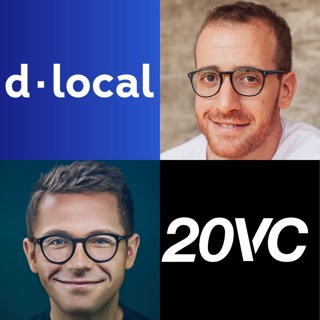
20VC: From Struggling to Raise Funding to IPOing at Close to $9BN Just Five Years Later; The $8BN Company You Might Not Know | How To Build Large Companies with Small Teams | The Biggest Hiring Lessons and Mistakes with Seba Kanovich, CEO @ dlocal
Seba Kanovich is the CEO @ dlocal, the #1 payments leader with a single solution focused on Latin America and other emerging markets. In June 2021, dlocal raised $617M in their NASDAQ IPO listing valuing the company at nearly $9BN. Before their IPO, dlocal raised from some of the best including General Atlantic, Bond Capital, and Oren Zeev to name a few. Prior to dlocal, Seba was CEO @ AstroPay, a leading payment solution provider in Emerging Markets. In Todays Episode with Seba Kanovich We Discuss: 1.) The Journey to CEO of an $8BN Company: How Seba made his way to the role of CEO of an $8BN company through dinner at his mother-in-law's house? What does Seba know now that he wishes he had known when he first became CEO? 2.) Leadership 101: What does "high performance" in business and leadership mean? How important are velocity and speed of execution in startups? When should one trade speed for quality? Where is the nuance? How does Seba approach prioritization? What framework does he use to determine what to focus on? How does Seba think through effective delegation? How can leaders determine what only they can do? 3.) Leadership: The Challenges and Lessons: What are Seba's biggest insecurities in leadership today? How does he manage them? How have they changed over time? What is the single most painful leadership lesson Seba has learned that he is also pleased to have learned? What gets easier with scale as a leader? What gets harder? In a scaling organization, what is the first thing to break? What can be done to mitigate this? 4.) The Funding and The IPO: Why did dlocal bootstrap for 4 years instead of raise funding? How did that process change their mindset toward capital efficiency? What was good about it? What was bad? What are the single biggest advantages great investors can bring to the table? Why did Seba decide 2021 was the right time to go public? What was the biggest surprise about going public? What is better and what is worse about being a public company? Items Mentioned in Today's Episode: Seba's Favourite Book: Steppenwolf by Herman Hesse
16 Syys 202239min
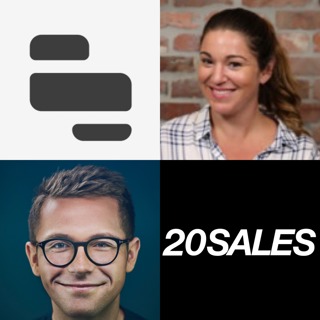
20 Sales: How To Interview Sales People; The Red Flags and What to Look For, How Sales Leaders Should Change Goals and Quotas in Harder Markets and What Reps Can Do To Ensure They Hit Their Numbers in These Markets with Eleanor Dorfman, Sales Leader @ Ret
Eleanor Dorfman is a Sales Leader @ Retool, the company that allows you to build internal tools, remarkably fast. Prior to Retool, Eleanor joined Retool when there were only three account executives and has scaled the sales org sales to over 30 AEs, many SEs, and an entire SDR team. Before Retool, Eleanor was at Segment, where she built out the company's customer success operations team before pivoting to creating an expansion sales team, renewals team, and a new business sales team. Finally, before Segment, Eleanor made her way into startups, starting as an unpaid intern at Clever, just four years later, Eleanor was Head of Customer Success and Solutions Engineering. In Today's Episode with Eleanor Dorfman We Discuss: 1.) Entry into Sales from Working with the US Education Department: How did Eleanor get her first role as an unpaid intern at Clever? What are 1-2 of her biggest takeaways from her time at Segment? What are the biggest advantages of sales reps having experience in customer success? 2.) The Sales Playbook: How does Eleanor define, "a sales playbook"? When does it need to be created? Does it need to be the founder who creates it or can it be a Head of Sales? Is it possible to run a PLG and enterprise motion from Day 1? How does this change your sales playbook? How does Eleanor advise founders on when is the right time to layer on an enterprise motion, on top of a PLG motion? 3.) Who, What and When: Building the Sales Team Should founders hire a Head of Sales first or sales reps first? If sales reps, should founders always hire sales reps in two's? How does Eleanor structure the hiring process for all new sales team recruits? What are the clearest signals of 10x sales hires? What are red flags in the interview process? How does Eleanor use demo's and case studies to determine technical ability? 4.) The First 30, 60 and 90 Days: The Onboarding: What is the right structure for all new sales hires to be onboarded? Why does Eleanor believe you will always hire your Head of Sales Enablement too late? What are the signs that now is the right time to hire your Head of Sales Enablement? What tools, materials and resources can founders provide to shorten the ramp time for new AEs? What are the single biggest mistakes founders make in the onboarding of new sales reps?
14 Syys 202237min
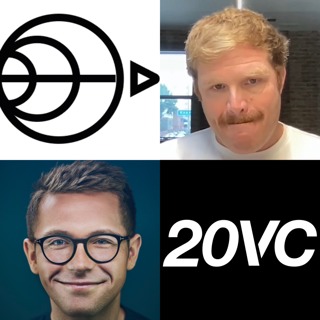
20VC: Why 95% of Venture Capital is Not Really "Venture Capital" | The Five Core Levers Needed To Assess Risk and Price a Startup | The Future of Venture; Who Wins, Who Loses, What Happens to the Crossover Funds with Will Quist, Partner @ Slow Ventures
Will Quist is a Partner @ Slow Ventures. Over the last decade, the team at Slow Ventures have invested in the earliest rounds of over 500 companies including Robinhood, NextDoor, Airtable, Solana and many more. As for Will, prior to Slow he spent over 8 years at Industry Ventures and before industry, cut his teeth in the world of finance at Banc of America. In Todays Episode with Will Quist We Discuss: 1.) Entry into Venture: How Will made his way from 6th generation San Francisco to Partner @ Slow? What are 1-2 of the biggest takeaways from his early 1-1s with Don Valentine? What does Will know now that he wishes he had known when he started in venture with Industry? 2.) WTF Really is Venture Capital? Why does Will believe that 95% of venture capital today is not really venture capital? What is true venture capital in Will's mind? How does Will divide the world of VC into two with; venture classic and new venture? How are they different? How are their return profiles different? 3.) The Questions: Discovering Greatness: Why does Will believe "for the most part, investors across asset classes are just asking the same questions"? What are those questions? What different answers are each looking for? What are the 5 core questions that will needs to understand to determine conviction and accurately price an asset? How does Will think through and analyze the question when meeting founders of; "what needs to come true for this business to become a great business"? 4.) The Future of Venture Capital: How does Will predict the venture capital ecosystem will look in 5 and then 10 years? What are the most concerning traits of the venture ecosystem for Will today? Who will be the winners of the next decade? Who will be the losers? What happens to the crossover funds? What will happen to Tiger?
12 Syys 202245min
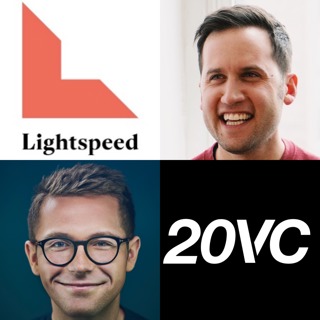
20VC News: Anchor Founder, Mike Mignano Joins Lightspeed as Partner: The Future of Social Media | Why Clubhouse Has a Challenging Model | Why TikTok Could be a $2TN Company | Why BeReal is Defensible | What Happens To OpenSea in a New World for NFTs
Mike Mignano is a Partner @ Lightspeed, one of the most successful venture firms of the last decade with a portfolio including the likes of Snap, Affirm, Epic Games, Mulesoft and more. As for Mike, prior to venture, he was Head of Talk for Spotify where he led the podcast, live, and video businesses for the world's leading audio streaming platform. Michael came to Spotify through their acquisition of Anchor, a company he co-founded and is credited for democratizing podcasting globally. Mike has also been a prolific angel investor with a portfolio including Cameo, Pipe, Sandbox VR and Stir. In Today's Episode with Mike Mignano We Discuss: 1.) Exclusive News: What exclusive news does Mike have to share today? What would Mike most like to change about the way founders experience the product of venture capital? How can VCs be better? What is Mike most nervous about in the new role? 2.) The World of Social is Changing Forever: Why does Mike believe there has never been a better time for the next social media giant to be born? Why are the largest social giants leaving behind the social graph? What is recommendation media? Why is it a better business model? How does the shift from social graph to recommendation media change the way large social giants operate and interact today? 3.) Startups: Risers, Fallers and Is There Room For Another Giant? What does Mike believe Clubhouse did well? What was their undoing? Does Mike believe BeReal is defensible? What features make it both sticky and defensible? Will TikTok be a $2 trillion dollar company? Will Meta catch TikTok or have they gone too far ahead? Will OpenSea be able to sustain and make the market for NFTs, despite crypto crashing? Should startups be concerned about large social giants "copying" their features? What does true defensibility look like in consumer social today? 4.) Angel Investing: Hits, Misses and Lessons: From writing over 50 angel checks, what are the single biggest lessons Mike has learned? What has been his biggest hit? How did that change the way he thinks about investing? What has been his biggest miss? In what way did that change how he invests? What advice does Mike give to all angel investors looking to invest today?
7 Syys 202254min
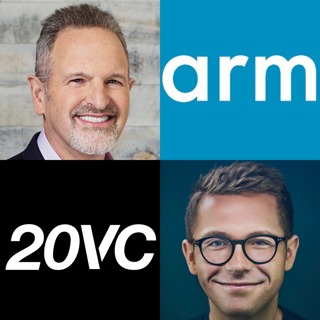
20VC: Arm CEO Rene Haas on How The Best Leaders Make Decisions and The Trade-Off Between Speed and Quality | Leadership Lessons from 7 Years at Nvidia | How Companies Can Retain Speed, Innovation and Agility at Scale
Rene Haas is the CEO @ Arm. The technologies that Arm creates are used in over 230+ Bn devices with everything from sensors to smartphones to servers. In 2016 Softbank made Arm it's largest ever acquisition with a reported price of $32Bn. As for Rene, he was appointed CEO in February 2022 having spent the last 8 years in numerous different roles within the company. Before Arm, Rene was Vice President & General Manager of the Computing Products Business Unit at Nvidia where he enjoyed a very successful 7 years with the team there. In Today's Episode with Rene Haas We Discuss: 1.) Entry into Tech from Eastman Kodak: How did Rene make his way into the world of technology and innovation? What are 1-2 of the biggest takeaways from his 7 years at Nvidia? How did working with Jensen impact his leadership approach and philosophy? 2.) Decision-Making in Leadership: What is the single biggest mistake leaders make when making decisions today? How does Rene balance the trade-off between speed vs quality of decision? At what point does Rene believe leaders have enough data to make a decision? What does Rene know now that he wishes he had known when he started on decisions? 3.) Scaling the Org and Remaining Nimble: Agile: How does one retain the speed and agility of a startup when one is the size that Arm is today? Ambition: How does Rene as a leader inspire the same level of ambition and vision in his team when Arm is as large as it is? Risk: How does Rene encourage his teams to take large risks when they have so much more to lose? Breakage: What are the first things to break in scaling? What can leaders do to get ahead of them? 4.) Leadership 101: What really is strategy? What is it not? What mistakes do all leaders make when it comes to strategy? How does Rene define "high performance" in leadership? How has his style of leadership changed over time? How does Rene approach vulnerability in leadership? What are the pros and cons?
2 Syys 202239min
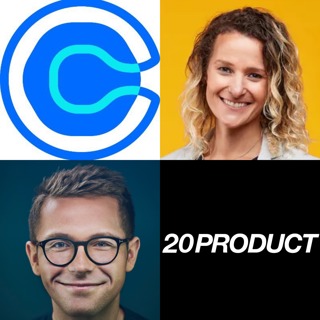
20Product: Calendly CPO Annie Pearl on Why All PLG Companies Eventually Need to Embrace Enterprise, Why it is Easier to Scale into Enterprise than Visa Versa and the Calendly PLG Playbook; What Works and What Does Not?
Annie Pearl is the CPO @ Calendly, the company that makes scheduling meetings simple and painless. The company now has over 10M users around the world and over 50,000 companies loving the product. As for Annie, before Calendly, Annie led Glassdoor's product vision and user experience, managing a 70 person product and design org. Prior to Glassdoor, Annie led enterprise product teams at Box both before and after their 2015 IPO. If this was not enough, Annie is also on the Board of WorkRamp and Well Health. In Today's Episode with Annie Pearl We Discuss: 1.) Entry into Product From Consulting: How did Annie make her way into the world of product and come to lead product teams at Box and GlassDoor? What are 1-2 of her biggest takeaways from her time at Box and GlassDoor? How did they impact her product mindset? What does Annie know now that she wishes she had known when she started in product? 2.) PLG vs Enterprise: What, When, How: Is it possible to do PLG and top-down enterprise strategy together from Day 1? Why does every PLG company eventually have to adopt an enterprise strategy? What are the single biggest challenges companies face when moving to enterprise? How do founders know when is the right time to make this transition? How do founders need to restructure their org to make the transition to enterprise? 3.) Building the Product Bench: Hiring: When is the right time to hire your first product leader? What are the core signals? What are the core character traits needed for a first product leader? How do we specifically structure the interview to test for them? Who do we bring into the interview process from other parts of the org? Do we do case studies with candidates? If so, how long do they have with the data? What is the difference between good vs great with case studies? 4.) Product Strategy, Reviews and Alignment: How does Annie assess how often product strategy should be reviewed? When should it change? How does Annie approach post-mortems? What is the right way to structure them? How does Annie create alignment between sales and product? Why is this so important? What is the single biggest product mistake Annie has made? What did she learn?
31 Elo 202245min


















